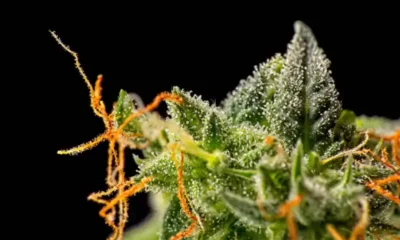Connect with us
Published
11 months agoon
By
Tyler Shultz
A federal grand jury in Los Angeles, California returned a five-count indictment accusing a Beverly Hills man of soliciting more than $9 million from investors for a nonexistent hemp farm.
According to Federal Bureau of Investigation investigators in the criminal complaint, prosecutors said Mark Roy Anderson used the money collected from investors for Harvest Farm Group to purchase a $1.3 million property in Ojai and $2.3 million on personal expenses such as vintage and luxury automobiles, chartered private jet flights and other high-end merchandise.
Anderson was indicted on five counts of wire fraud after telling investors that their money would be used to extract medical-grade CBD from a hemp farm he owned and sold for a substantial profit. Data from the “Global Hemp Market by Type” report from Research and Markets projects the global hemp industry will reach over $18 billion within the next five years as more and more countries have or have plans to legalize industrial hemp.
“To induce the victim-investors to invest in Harvest Farm Group, defendant Anderson falsely represented that, through Harvest Farm Group: he owned and operated a hemp farm in Kern County, California; he had already completed successful and profitable harvests of hemp from the farm; and he was using his own machinery and equipment to convert the hemp into CBD isolate and/or Delta 8, a psychoactive substance that, like CBD isolate, could be used in consumer products ranging from olive oil to body cream,” the indictment read.
Anderson has a history of scams dating back to the 1980s when he ran a Ponzi scheme that solicited money from investors to purchase and restore historic buildings around the country, which earned him a seven-year prison sentence. In the 2000s, he set up another scheme in which he cheated investors out of $9 million for what the FBI called a “misdescribed” oil business and was sent to prison again for 135 months. After seven years, Anderson was released from prison under an elderly offender pilot project and placed in home detention for 18 months. In November 2020 he began a three-year supervised release sentence with a condition of his probation being he was not allowed to partake in any investment projects.
Anderson contacted an Arkansas-based investment manager to pitch his “hemp business,” telling the investment manager that he owned a farm in Kern County, California. Two of the investors eventually hired a private investigator who found the hemp farm Anderson claimed to own was actually a vineyard owned by an unrelated party. Anderson also provided pictures and videos of purported harvests which turned out to be stock images from the internet.
“Anderson allegedly attempted to maintain a veneer of trustworthiness by taking steps to assure investors Harvest Farms Group was legitimate and ‘he was not the Mark Roy Anderson’ with multiple prior fraud convictions,” according to a statement from the U.S. attorney’s office in Los Angeles.
The Securities and Exchange Commission recently obtained an emergency order to halt an alleged ongoing offering fraud and a Ponzi-like scheme by Integrated National Resources Inc. (INR), which does business as WeedGenics. According to the complaint, at least since 2019, owners Rolf Max Hirschmann and Patrick Earl Williams have raised more than $60 million to expand the facilities for their cannabis operation but instead have used the funds to make $16.2 million in Ponzi-like payments to enrich themselves. Investors were promised returns of up to 36 percent, but neither Hirschmann or Williams owned or operated any facilities. The SEC’s complaint charges the defendants with violating the antifraud provisions of the securities laws and a hearing is scheduled in June to consider whether to issue a preliminary injunction and appoint a permanent receiver.


Despite City Efforts, Hemp Shops Posing as Dispensaries Prevail in Las Vegas


Cannabis Community, Investors React to DEA Decision To Reschedule


Georgia Governor Signs Bill Establishing Licensing Requirements To Grow Hemp


Study: Psilocybin Enhances Meditation


Ohio GOP Lawmakers Debate Adult-Use MJ Priorities, Eye June for Regulation Approval


Taylor Swift Puts Narcotics Into All of Her Songs on ‘The Tortured Poets Department’
